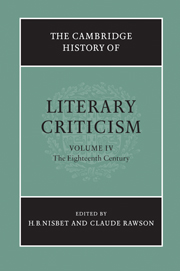Book contents
- Frontmatter
- INTRODUCTION: CRITICISM AND TRADITION
- GENRES
- 3 Poetry, 1660-1740
- 4 Poetry, after 1740
- 5 Drama, 1660-1740
- 6 Drama, after 1740
- 7 Prose fiction: France
- 8 Prose fiction: Great Britain
- 9 Prose fiction: Germany and the Netherlands
- 10 Historiography
- 11 Biography and autobiography
- 12 Criticism and the rise of periodical literature
- LANGUAGE AND STYLE
- THEMES AND MOVEMENTS
- LITERATURE AND OTHER DISCIPLINES
- Bibliography
- Index
- References
8 - Prose fiction: Great Britain
from GENRES
Published online by Cambridge University Press: 28 March 2008
- Frontmatter
- INTRODUCTION: CRITICISM AND TRADITION
- GENRES
- 3 Poetry, 1660-1740
- 4 Poetry, after 1740
- 5 Drama, 1660-1740
- 6 Drama, after 1740
- 7 Prose fiction: France
- 8 Prose fiction: Great Britain
- 9 Prose fiction: Germany and the Netherlands
- 10 Historiography
- 11 Biography and autobiography
- 12 Criticism and the rise of periodical literature
- LANGUAGE AND STYLE
- THEMES AND MOVEMENTS
- LITERATURE AND OTHER DISCIPLINES
- Bibliography
- Index
- References
Summary
In the following essay I will pursue the theory of prose fiction by attending to the emergent theory of the novel. The theory of a genre in the process of coming into being is discovered in unpredictable places, many of them extra-‘literary’. During the first half of our period, the theory of the novel appears in a variety of discourses in which the epistemology of fiction is being treated, and often in the interstices of narrative itself. Later on, novel theory ceases to be so commonly embedded in practice itself because it is being separated out and institutionalized within the discourse of the periodical review. I will draw upon these several sources in order to suggest the expansive character of a theory whose terms have not yet been securely formulated.
For those who take the novel to be an ancient form given new life in the eighteenth century, the history both of prose fiction and of its theory in this period will cohere as the complicating development of what is none the less a familiar and continuous genre. Contemporaries, however, tended not to see things this way. For them, the novelty of the novel was an essential feature of the form - hence its theory and its poetics (the rules for composing novels) were at best uncertain. This meant different things to different people. In some it aroused apprehension: ‘I know not whether [the] novel, like the epopee, has any rules, peculiar to itself. If it has, I may have innocently erred against them all …’
- Type
- Chapter
- Information
- The Cambridge History of Literary Criticism , pp. 238 - 263Publisher: Cambridge University PressPrint publication year: 1997
References
- 1
- Cited by



